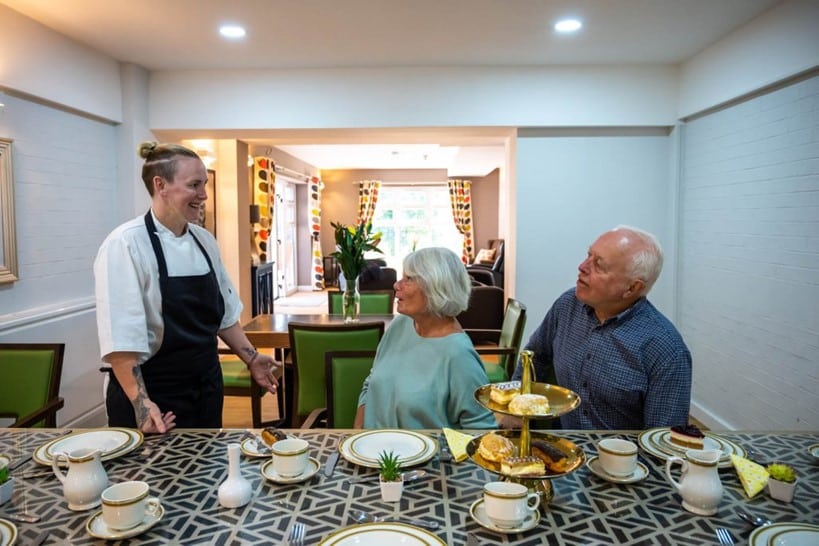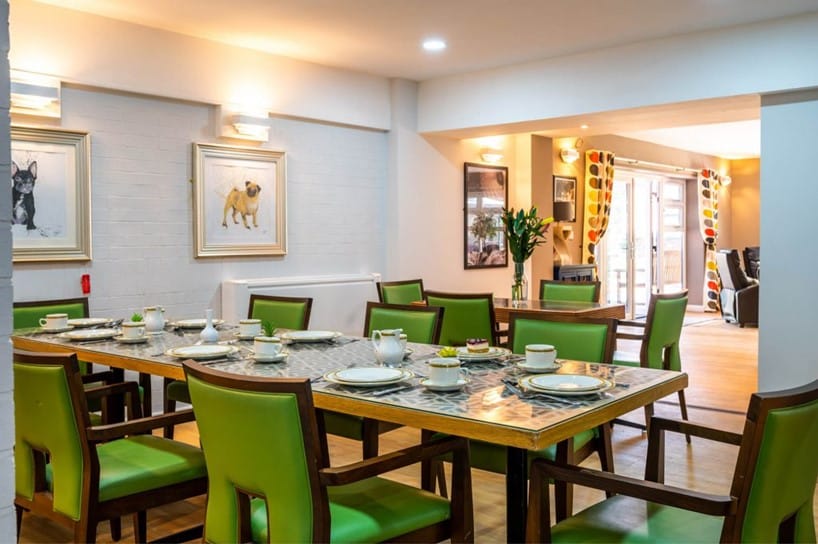
Dining Delights in Residential Care Homes
As we delve into the world of residential care homes, a critical aspect that often goes overlooked is the dining experience. With the ageing population and the increasing need for quality care, the concept of care home dining has evolved significantly. It’s not just about providing meals; it’s about creating a nourishing, enjoyable, and socially engaging environment. But what exactly makes care home dining so pivotal in the overall wellbeing of residents?
And how have care homes adapted to cater to the diverse culinary needs and preferences of their residents? Let’s explore these dimensions, and in doing so, ponder over this question: How does care home dining impact the quality of life for those in residential care?
Understanding Care Home Dining: An Overview
The Importance of Quality Dining in Care Homes
Care home dining plays a vital role in ensuring the health and happiness of residents. Quality meals contribute to their physical well-being, while the dining experience itself can be a source of joy and social interaction. The importance of palatable, nutritious food in care homes cannot be overstated, as it directly impacts the residents’ quality of life.
Evolution of Dining Standards in Residential Care
The evolution of dining standards in care homes reflects a broader shift towards personalised and resident-centred care. Gone are the days of one-size-fits-all meals. Today, care home dining encompasses a wide range of dietary preferences and needs, mirroring the diversity of the residents themselves.
Culinary Preferences and Requirements in Care Homes
Understanding and catering to the varied culinary preferences and requirements is a hallmark of excellent care home dining. This includes accommodating cultural food preferences, religious dietary restrictions, and personal likes and dislikes, ensuring that every resident feels valued and respected.
Nutritional Considerations in Care Home Menus
Balancing Dietary Needs with Enjoyment
Achieving a balance between meeting dietary needs and providing enjoyable meals is crucial in care home menus. This involves creating dishes that are not only nutritious but also appealing and tasty, thereby enhancing the overall dining experience for residents.
Special Dietary Requirements: Addressing Allergies and Intolerances
Care homes must be adept at addressing special dietary requirements, including allergies and intolerances. This requires a meticulous approach to menu planning and food preparation, ensuring the safety and well-being of all residents.
The Role of Nutritionists in Menu Planning
Nutritionists play a key role in designing care home menus. Their expertise ensures that meals are balanced, nutrient-rich, and tailored to the health needs of the elderly, such as managing diabetes or heart conditions, thus contributing significantly to the residents’ overall health.
The Social Aspect of Dining in Care Homes
Creating a Community Atmosphere at Meal Times
Meal times in care homes are not just about eating; they’re opportunities for social interaction and community building. Creating a warm, communal atmosphere during meals can significantly enhance the residents’ sense of belonging and emotional well-being.
Organising Social Dining Events
Organising social dining events, such as themed dinners or celebratory meals, adds an extra layer of excitement and engagement in the daily lives of residents. These events provide opportunities for socialisation, entertainment, and breaking the monotony of routine.
Impact of Dining Together on Residents’ Wellbeing
The act of dining together can have a profound impact on the residents’ mental and emotional wellbeing. It fosters a sense of community, combats loneliness, and provides a platform for interaction and engagement among residents.
Innovative Dining Experiences in Care Homes
Themed Dinners and Cultural Celebrations
Themed dinners and cultural celebrations are ways to bring vibrancy and diversity to care home dining. These events not only cater to the residents’ cultural backgrounds but also provide an educational and enriching experience for everyone involved.
Interactive Cooking Sessions with Residents
Interactive cooking sessions offer residents a chance to engage actively in meal preparation, providing a sense of accomplishment and participation. These sessions can be therapeutic and empowering, fostering a sense of independence and self-worth.
Garden-to-Table: Incorporating Homegrown Produce
The garden-to-table concept, where residents participate in growing and harvesting ingredients used in their meals, adds a fresh and meaningful dimension to care home dining. It promotes sustainability and offers residents a gratifying connection to the food they consume.
Ensuring Hygiene and Safety in Care Home Dining
Adhering to Food Safety Standards
Adherence to food safety standards is non-negotiable in care home dining. This involves rigorous protocols for food handling, preparation, and storage, ensuring that meals are safe and hygienic.
Training Staff for Optimal Hygiene Practices
Training staff in optimal hygiene practices is essential for maintaining high standards in care home dining. This includes regular training and updates on the latest food safety guidelines and practices.
Regular Health Inspections and Compliance
Regular health inspections and compliance with regulatory standards are crucial for maintaining the integrity of care home dining. These inspections ensure that the dining experience is not only enjoyable but also safe and healthy for all residents.
Feedback and Continuous Improvement in Dining Services
Gathering Resident Feedback on Meals
Actively gathering and responding to resident feedback on meals is vital for continuous improvement in dining services. This feedback helps in tailoring the dining experience to meet the evolving needs and preferences of the residents.
Implementing Changes Based on Preferences and Feedback
Implementing changes based on resident preferences and feedback is a dynamic process that keeps the dining experience relevant and enjoyable. It demonstrates a commitment to resident satisfaction and well-being.
Regular Review and Update of Dining Policies
Regularly reviewing and updating dining policies ensure that care home dining remains adaptive and responsive to the needs of the residents. This continuous evolution reflects a dedication to excellence in resident care.
Conclusion
In the realm of residential care, the significance of “care home dining” extends far beyond mere sustenance. It’s about nurturing the body and soul, creating a sense of community, and respecting the diverse needs and preferences of every resident. As we’ve explored, from nutritional considerations to the social and innovative aspects of dining, it’s clear that care home dining plays a fundamental role in enhancing the quality of life for residents. The question then is not just about what is served on the plate, but how it contributes to the overall experience of those in residential care. Isn’t it remarkable how a simple act of dining can mean so much more in the context of care homes?
Summary
Exploring the nuances of “care home dining,” this article delves into how residential care homes enhance the dining experience for their residents. From nutritional considerations and the social aspects of dining to innovative experiences and strict hygiene standards, the article underscores the importance of quality dining in care homes. It highlights how care home dining significantly impacts the overall wellbeing and quality of life of the elderly, offering more than just sustenance but a sense of community, respect for diversity, and continuous improvement based on feedback.
Frequently Asked Questions
What are the key elements of quality care home dining?
Quality care home dining focuses on several key elements. Firstly, it involves offering nutritious and balanced meals that cater to the health requirements of the elderly. Secondly, the dining experience should consider the diverse dietary needs and preferences of residents, including cultural and religious dietary restrictions, allergies, and personal likes. Thirdly, the social aspect of dining is crucial, as meal times are opportunities for social interaction and community building among residents. Finally, maintaining high standards of hygiene and food safety is paramount to ensure the wellbeing of the residents.
How do care homes address diverse dietary requirements and preferences?
Care homes address diverse dietary requirements and preferences by closely working with nutritionists and chefs to create varied and flexible menu options. They take into account individual dietary needs such as low-sodium, gluten-free, diabetic-friendly, or vegetarian diets. Additionally, they consider cultural and religious food preferences, ensuring that meals are not just nutritionally adequate but also culturally appropriate and enjoyable for all residents.
What role does social interaction play in care home dining experiences?
Social interaction plays a significant role in care home dining experiences. Meal times are viewed as communal activities that encourage interaction and companionship among residents. Organising social dining events, themed dinners, and celebrating cultural festivals through food helps in creating a lively and engaging atmosphere. Such interactions during meal times can greatly enhance the residents’ overall sense of belonging, wellbeing, and happiness.
What innovative dining experiences are offered in residential care homes?
Residential care homes offer a range of innovative dining experiences to keep meal times interesting and engaging. These may include themed dinners, where meals are based on specific cultural or historical themes, interactive cooking sessions where residents can participate in meal preparation, and garden-to-table programs that involve residents in growing and harvesting ingredients. These experiences not only add variety to the daily routine but also provide sensory stimulation and a sense of achievement to the residents.
How do care homes ensure hygiene and safety in their dining services?
Care homes ensure hygiene and safety in dining services by adhering to strict food safety standards and regulations. This involves regular training for staff in food handling, preparation, and storage practices. Kitchens are equipped with necessary facilities to maintain cleanliness and prevent cross-contamination. Regular health inspections are conducted to ensure compliance with hygiene standards. Additionally, care homes often have protocols in place for monitoring and managing any food-related allergies or intolerances among residents.
Riseley House Food and Dining Options
We understand that food and dining are not merely about sustenance but also about creating an enjoyable and communal experience. We take great pride in offering a dining service that caters for diverse tastes and dietary needs, ensuring every meal is a stimulating, enjoyable experience.
Request a Quote
If you are interested in any of our services and would like a quote for either short or long term care options, then please complete and submit the form provided and we will contact you at our earliest opportunity.
[wpforms id=”426″]
The Benefits of High-Quality, Privately Owned Residential Care Homes
In the wide spectrum of residential care home types, the allure of professional, high-quality, privately owned homes is undeniably prominent. These establishments offer an unrivalled blend of services that encompass residential care, dementia care, end of life care, and respite care. But what makes them stand out in the bustling arena of elderly care?
Tailored, Person-Centred Care
One of the most salient advantages of private establishments is the bespoke care they offer. Driven by a commitment to person-centred care, these homes tailor their services, ensuring every individual’s unique needs are met. It’s not just about following a set routine, but crafting a personalised care plan that echoes with the resident’s life story, preferences, and medical requirements.
Enhanced Staff-to-Resident Ratio
Privately owned care homes often boast a higher staff-to-resident ratio. This ensures that every resident receives ample attention, fostering an environment where care is not just professional but also intimate. Isn’t it reassuring to know that there’s always a helping hand around?
State-of-the-Art Amenities
With the luxury of private funding, these homes frequently reinvest in their infrastructure. This translates to state-of-the-art amenities, from therapeutic gardens to sensory rooms, all designed to enrich the lives of residents. Imagine a place where every corner resonates with purpose, be it relaxation, stimulation, or rehabilitation.
Specialised Training and Expertise
The realm of dementia care and end of life care requires a depth of understanding that goes beyond basic training. Privately owned homes often invest in continuous staff training, ensuring they’re abreast with the latest in elderly care methodologies. With such expertise, residents with specific needs, like dementia or terminal illnesses, find an environment that’s not just safe but also profoundly empathetic.
Flexibility in Service Offering
Given their private nature, these homes offer a degree of flexibility that might be harder to find in larger, institutional settings. Be it dietary preferences, activity schedules, or visitation timings, there’s a palpable sense of adaptability that caters to both residents and their families.
A Homely Atmosphere
While professionalism is a given, privately owned residential care homes often radiate a warmth that feels unmistakably homely. Smaller in scale, these homes can nurture a close-knit community, where relationships blossom not just among residents but also between the staff and residents. It’s a place where the heart finds comfort, as much as the body finds care.
Conclusion
In the tapestry of residential care home types, high-quality, privately owned homes shine with a distinct lustre. Their commitment to bespoke care, coupled with their emphasis on creating a nurturing environment, positions them as a compelling choice for those seeking nothing but the best for their loved ones.
Why Choose Riseley House Residential Care Home
At Riseley House Residential Care Home, every member of our team receives training tailored to providing a broad range of support to our residents. Riseley House provides specialised care services for a wide range of people who require around the clock support.
Our residents are supported with 24-hour companionship, personal care, and safety, all whilst living in a comfortable, homely environment and we are on hand around the clock so residents have the freedom and the peace of mind in knowing that all the little things are taken care of.
Our Care Services

Residential Care
Dementia Care
Respite Care
End Of Life Care
Riseley House Environment & Facilities
Riseley House is set over 3 secure floors. Each floor is self contained with a wide range of facilities and a host of carefully designed spaces to add character and interest for those living with us, these include: The Manor Room, the Library, the Treacle Town Cafe, the Adelphi Cinema, the Beach and much more.
Modern Luxury AccomodationOpened in 2022, Riseley House provides high quality facilities and careSafe and Secure Environment24/7 rotational security and care staff for your peace of mind65 Large BedroomsAverage size 18 – 20 m2 with single bed, furnishings and tasteful decorModern En-Suite Shower RoomAll shower rooms are fully fitted and senior friendly Therapy RoomOur therapy and treatment room is available to all residents 24/7Hairdressing SalonResidents can book an appointment or invite their own hairdresserOnsite Commercial-Quality LaundryAll laundry needs are catered for – washing, drying, ironing, hanging.Restaurant Style DiningHealthy eating options served with luxury crockery and cutleryCafe Style DiningInformal, themed cafe style eating areas Onsite Chef and Kitchen StaffOur professional and dedicated team cater to all nutritional needsLibrary and Reading RoomResidents are provided with a quiet get away to browse and read booksDay Rooms and TV RoomsWe provide light, specious areas to relax, take part in activities or watch TV Adelphi Cinema and Tea RoomA warm and relaxing atmosphere to watch classic and modern cinema Free High Speed WiFiWe provide free, high speed WiFi throughout Riseley HouseAmple Onsite Free ParkingRiseley House has 3 private, dedicated, onsite car parking areas Beautiful Gardens A range of lawned and patio areas with raised plantersTranquil Outdoor SpacesOutdoor dining and socialising when the weather permits
Previous slide
Next slide
Book A Viewing
Our staff will be delighted to show you around and guide you as you make a choice. We recommend you take a tour in person so you can meet the staff, learn more about daily life at Riseley House, and ask any questions you may have. We provide daily appointments, 7 days a week, between 2pm and 4pm.
[wpforms id=”295″]
Share This Article
Facebook
Twitter
LinkedIn
Icon-email
Icon-phone
Facebook
Linkedin
Youtube
Request A Brochure
[wpforms id=”535″]





